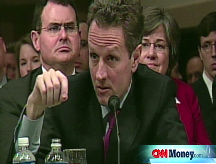Geithner pressed for details
Members of Senate budget panel say Treasury secretary needs to 'put meat on bones' of revised financial rescue plan.
NEW YORK (CNNMoney.com) -- A day after unveiling his new financial rescue plan, Treasury Secretary Tim Geithner again went before Congress to defend it.
Geithner's revised bailout was met with disappointment on Wall Street and with some lawmakers who thought Treasury's plan was lacking in details.
At a hearing held Wednesday by the Senate Budget Committee, senators pressed Geithner to give more specifics about Treasury's new bailout efforts.
"The market has made clear that certainty and stability are commodities of great demand; unfortunately, that is not what we received yesterday," said Sen. Jeff Sessions, R-Ala. "Secretary Geithner, you need to give a detailed plan in clear terms of how we are to proceed. You've had more than a month to work on the proposal, but what we've heard is an outline."
"I hope you can use the hearing today to put some meat on the bones," Sessions added.
But Geithner did not give any more details. He said Treasury is continuing to explore structures for the design of the new programs, and pledged to work with lawmakers to hammer out the specifics.
"The president, the Treasury, and the entire administration are committed to working with you to see it through because we know how directly the future of our economy depends on it," Geithner said.
Committee Chairman Kent Conrad, D-N.D., told Geithner that he got a free pass on Wednesday, but Treasury needs to be more forthcoming very soon so the committee can budget for the housing and lending fix.
"You've been very careful today not to provide more detail," said Conrad. "I'm not going to pressure you today, but I'm going to give you a heads up: Very soon, we're going to need you to give us a sense of what funds are needed."
Geithner said details will be coming in the next several weeks, after Treasury assesses the financial sector's overall need and determines how to design the plan.
In addition to the lack of specifics, the revised program has been criticized for not going far enough to rescue the financial sector.
Some lawmakers were angered that the plan does not force banks to lend. The new plan pledges to closely monitor banks' lending habits, but does not sanction banks if they don't use the bailout money for lending.
Geithner said banks' plans for using government funding must be approved prior to Treasury doling out funds, but requiring banks to lend would be inappropriate.
"It's hard to judge what the economically viable level of lending will be in a recession," Geithner said. "There will be things that produce outcomes that are different from what their initial plans are."
Some committee members also wondered if the bailout plan had enough funds left to accomplish all of Geithner's goals, including rescuing the housing sector.
Geithner said the nearly $320 billion left in the Troubled Asset Relief Program will be enough to start, and a request for more money - if needed - will be done "with as much care and consultation and design as possible."
"Congress has already authorized substantial resources, and we're going to use those resources effectively," Geithner said.
Some lawmakers said they were concerned about the total cost of the program. Conrad referenced several media reports that the government's financial rescue efforts have escalated to between $8 trillion and $10 trillion.
Geithner said much of that money is in guarantees and loans that the government will likely get back or never shell out in the first place.
"These numbers are very large, but they are predominately loans against collateral," Geithner. "Those broad numbers do not represent the cost to taxpayers or the borrowing needs of the country."
Despite the cost, the Treasury secretary said the government must dedicate all of its efforts to restore the financial markets to normalcy, because the cost to fix the financial sector could be much greater down the road if action isn't taken.
"If we are not forceful now, ultimately it will be harder for us to get back to fiscal responsibility," he said. "The most fiscally responsible position is to address those problems, because it will mean less cost to the taxpayer than the alternative path, which is letting those problems continue." ![]()


